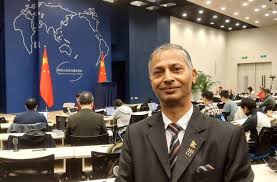
By Deepak Joshi Pokhrel
In 2006, in a book titled Failed States: The Abuse of Power and the Assault on Democracy, the great scholar Noam Chomsky argued that the United States has become a failed state, failing to protect its citizens while the government abuses power both domestically and internationally. It also analyzed how the US government engaged in policies that harm its citizens, bypass international laws, and endanger the world through invasions like Iraq. Well, this argument is more relevant in Nepal than in the United States of America, as politicians – both opposition and those in power – are known for abusing their authority, endangering the hard-earned democracy in Nepal.
This piece attempts to explain how the untiring Nepali politicians of all hues have assaulted democracy for their personal benefit. It also attempts to underscore how democracy is misinterpreted and how democratic institutions are controlled by select politicians to remain in power indefinitely by decree.
The struggle for democracy has a long history in Nepal. It all started with a struggle against different political systems in the past by three major movements: the 1950–51 revolution that ended the Rana dynasty; the 1990 People’s Movement that introduced a multiparty democracy by suspending the Panchayat system; and the 2006 Loktantra Andolan, which abolished the monarchy and established the federal republic. But now questions are being raised, asking whether democracy is controlled by a few politicians instead of serving everyone.
A former US president defined democracy as “a government of the people, by the people, and for the people.” This universal and famous definition, given in his Gettysburg Address, encapsulates the idea that democracy is a system where the government derives its power from the people and exists to serve the will of the citizen. In plain words, the vested power lies with the people to elect their representatives to govern them. But this is not the case in our context.
But why has the best form of governance, practised across the globe except in a few places, failed in Nepal? The answer to this question is not big; it is very simple. Democratic values, norms, and ethos are upheld by politicians only in a country where democracy is vibrant. To our great chagrin, the politicians in Nepal are sabotaging and undermining the democratic norms, values, and practices they once nurtured. The present politicians are more unaccountable, ruthless, arrogant, and self-centred than all previous regimes combined. Consider the case of parliament dissolution by the then prime minister KP Oli in 2019. This is just one example; there are several others.
Since becoming a republic, Nepal has cycled through 14 governments, each mired in infighting, patronage, and corruption. Many among them could not last even a year, let alone a full term. For a generation raised on democratic promise but denied progress, the political elite has become the symbol of state failure.
When we assess our experience with democracy post-monarchy era, we find that it has been controlled by three politicians – KP Oli, Prachanda, and Deuba. They join hands for power and soon dissociate if it does not serve their interests. What matters for them is to cling to power, no matter how it comes. The game of musical chairs by these three individuals over power sharing has forced people to rethink whether the decision to abolish the monarchy was an appropriate one.
Not only politicians, but also the so-called NGOs/CSOs and media – viewed as the fourth pillar of democracy – have not been functioning in their true spirit of service. Both have failed to live up to the expectations of the people. The leaders of civil society are politically divided. That is to say, they work along partisan lines. The heads of NGOs are appointed on the basis of their political affiliations. The pro-UML civil society leaders will not bother to speak against the unconstitutional and undemocratic moves of UML. Similarly, pro-Congress civil society leaders will not stage a protest at Maitighar against it. The same applies to pro-Maoist civil society leaders as well. When we have such civil society leaders, democracy is always under threat.
At the same time, the media is indiscriminately controlled and managed by politicians. Exceptions apart, editors and reporters are also appointed on the basis of their political affiliations and not based on their personal experience and background. Those who pledge loyalty to their political masters are appointed. Such selective writing and presenting pleases their masters. Democracy will always be under attack if the media dance to the tune of politicians instead of unfolding the hard truth and speaking on behalf of the people.
Another threat is the increasing rise of pro-monarchists in the recent past. Supporters of the monarchy have been staging protests demanding the reinstatement of the monarchy and the revival of the Hindu state. According to them, democracy has failed to fulfil the needs and aspirations of the people. To some extent, their argument is justifiable. More than one and a half decades have passed since we became a secular republic. But injustice, inequality, nepotism, and favoritism still thrive and continue in Nepal.
Just recently, the country witnessed a Gen Z movement demanding an end to corruption and ensuring good governance. The movement forced KP Oli to step down, paving the way for the formation of an interim government to conduct a general election soon. Had our democracy been functioning effectively, the youth would not have needed to stage a protest in which over 70 people were indiscriminately gunned down by police personnel.
Democracy needs politicians to grow and be nurtured. It is like a growing child. At present, it is fragile and vulnerable, and therefore it requires support, care, and nourishment. Once it is firmly settled, it becomes the most stable and secure form of government. But it is really very disheartening to witness that our politicians have not understood this simple and well-established truth.













Comments:
Leave a Reply